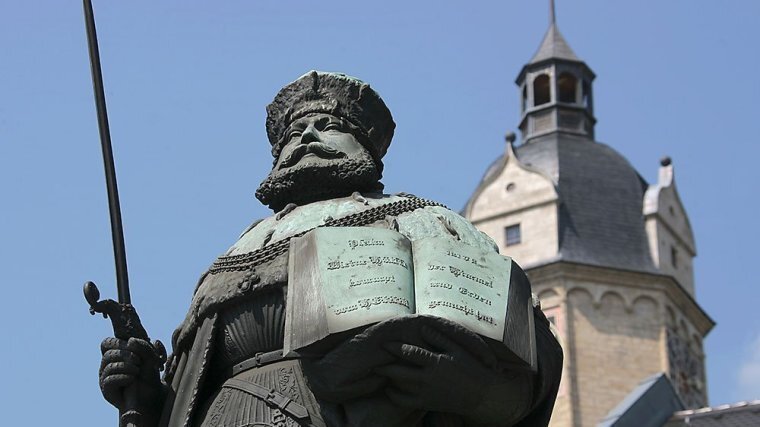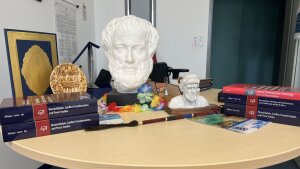
Averroes was both the greatest interpreter and defender of Aristotle in the Islamic world, serving as the bridge by which Aristotle’s philosophy profoundly transformed medieval Christian and later Western thought
Image: Aristotal and Averros (Ibn Rushd) in AARMENAUniversity of Jena - Doctoral program "Reconciliation, Conflict Transformation & Peace Studies" (RCPS)
The School of Thought:
The AARMENA school of thought is based on the Aristotelian concepts and the relation with Averros (IBN RUSHD) on Three Philosophical grounds:
- Philosophy and religion are not contradictory; they both aim at truth, but in different ways.
- The Holy Scriptures encourage rational inquiry, so philosophical reasoning (like Aristotle’s) is a legitimate path to understanding divine wisdom.
- Scriptural metaphors can be interpreted allegorically when reason proves otherwise — a revolutionary idea to develop reconciliation and peacebuilding studies and science.
The Doctoral School program
"Reconciliation, Conflict Transformation, Peace Studies" (RCPS) conducts transdisciplinary research, making innovative contributions to conflict transformation and peace studies within reconciliation processes amid conflicts. Click on the program.
The AARMENA Ph.D. program focuses on reconciliation, conflict transformation, and peace studies within an inter-transdisciplinary scientific framework. We are advancing Applied Phronesis research in these areas to identify best practices across various disciplines, including Education, Politics, Law, Religion, Media, Geography, Tourism, Urbanism, Economics, Digital Humanities, Security, and Community Peace.
RCPS studies conflict transformation, reconciliation, and peace processes, methods, strategies, research, and practices, focusing on comparative analyses, case studies, narrative research, ethnography netnography, phenomenology research, and best practices as part of transdisciplinary research within Phronesis Research in reconciliation, conflict transformation, and peace studies.
Reconciliation, conflict transformation, and peace-building approaches provide hope for development and prosperity in areas marked by ongoing violence and tensions, particularly in the Middle East and North Africa, where ethnic, historical, and cultural ideologies often fuel conflict. Members of the RPS (Reconciliation and Peace Studies) program aim to learn from recent successes by integrating transdisciplinary academic disciplines to achieve practical goals.
The Academic Alliance for Reconciliation Peace Studies offers opportunities to combine theoretical, practical, and pedagogical approaches, including research methods, and to develop projects focused on reconciliation and peace studies. The RPS program is research-oriented and values projects that draw from various academic fields, utilising a full range of qualitative, quantitative, and mixed-methods research designs, along with Internet research methodologies incorporated into Phronesis research.
Ph.D Process for New Candidates:
To proceed in the doctoral program of RCPS, he or she will need to complete the following requirements:
1. Write a 20-page Ph.D. proposal on "Reconciliation, Conflict Transformation, and Peace."
2. Attend the winter and summer semester seminars, which will be conducted in a hybrid format via the Zoom platform—ten sessions—once a week each semester.
3. Present his/her research proposal at a Ph.D. seminar in front of the scientific committee of AARMENA.
4. Secure the support of two professors from the University of Jena interested in his research area.
5. Sign a contract with the doctoral school and two professors and submit it to the Graduate Academy of Friedrich Schiller University.
Typically, all candidates who have not yet been accepted can begin with Phases 1 and 2 of the requirements. Please note that this is a part-time research Ph.D. program, and he or she must coordinate meeting times with the professors at the University of Jena Only.
RCPS develops exchange opportunities that are available through agreements with the AARMENA network on three levels.
Adjunct Courses for the AARMENA Doctoral School:
- How to write a Ph.D. proposal for the doctoral school in Germany 1.1rections for Writing a Correct Ph.D. Proposal
- Discuss the guidelines for a Ph.D. proposal for the DAAD Deutscher Akademischer Austausch Dienst (German Academic Exchange Service) and scholarships. 1.4. The AARMENA template for a Ph.D. proposal in reconciliation, conflict transformation, and peace studies
- Teaching Peace Studies & Qualities and Strategies of Peacemakers (Movie analysis).
- How to formulate a Ph.D. Dissertation in the doctoral program:
- Elements of the dissertation include the literature review, State of the Art, Hypothesis, methodologies, and conclusions.
- To clarify the difference between research, case studies and doctoral research.
- How to formulate a theoretical framework in accordance with our Reconciliation theory in the context of conflict, towards peace.
- To research and integrate an Interdisciplinary or Transdisciplinary scientific discourse.
- How to formulate a theoretical framework for the reconciliation process in the middle of conflict
- Formulate research questions to examine theories of Reconciliation, Conflict Transformation and Peace.
- Develop the hypothesis for the research by combining theories in the theoretical framework.
- Determine which scientific methodologies you would choose to implement: Interdisciplinary or Transdisciplinary, and explain why..
- Integrate 20 books as reference theories combined in Reconciliation, Conflict Transformation, and Peace Studies.
- How to Formulate pages about 'The State of the Art', and discuss it in the class
- The citation procedure, manual, and software usage for Social Psychology, Ethics, Economics group, US - Universities Reconciliation, and Peace Institutions.
- Bibliography and Reference Building.
- Methodology Course: It focuses on the Methodologies of Mixed-Method, Qualitative, and Quantitative research design, and using NVivo for Windows for Qualitative analysis.
- Negotiations for Reconciliation methods
- Personal Tutoring for doctoral research and dissertation sessions should be arranged at the convenience of the professor or coordinator.
Please contact the coordinator for the courses: a.aldajani@uni-jena.de, or ayad.dajani@gmail.com
International Cooperation within the Doctoral School
Internationally Academic Alliance for Reconciliation for the Middle East and North Africa Network: Irish School of Ecumenics in Dublin / Belfast; AICGAS Johns Hopkins University; Excellence School of Conflict Analysis and Resolution George Mason University, Washington DC. Mary Hoch Institute for Reconciliation, Washington DC. Martin Springer Institute at Northern Arizona University (USA); Peace Institute of Myanmar; Doshisha University Kyoto (Japan); Beyers Naude Center for Public Theology at Stellenbosch University (South Africa), Charles Sturt University (Australia), Asia Center for Reconciliation Studies (ACRS) at Seoul Theological University; Sung Kong Hoe University, Seoul (South Korea); Alberto Hurtado University (Santiago, Chile); University of Antioquia (Medellin, Colombia); University of Petra (Amman, Jordan).The University of Jordan,
For more information regarding Ph.D. For the program, please contact AARMENA Coordinator of the doctoral school Dr. AlDajani for more information.
